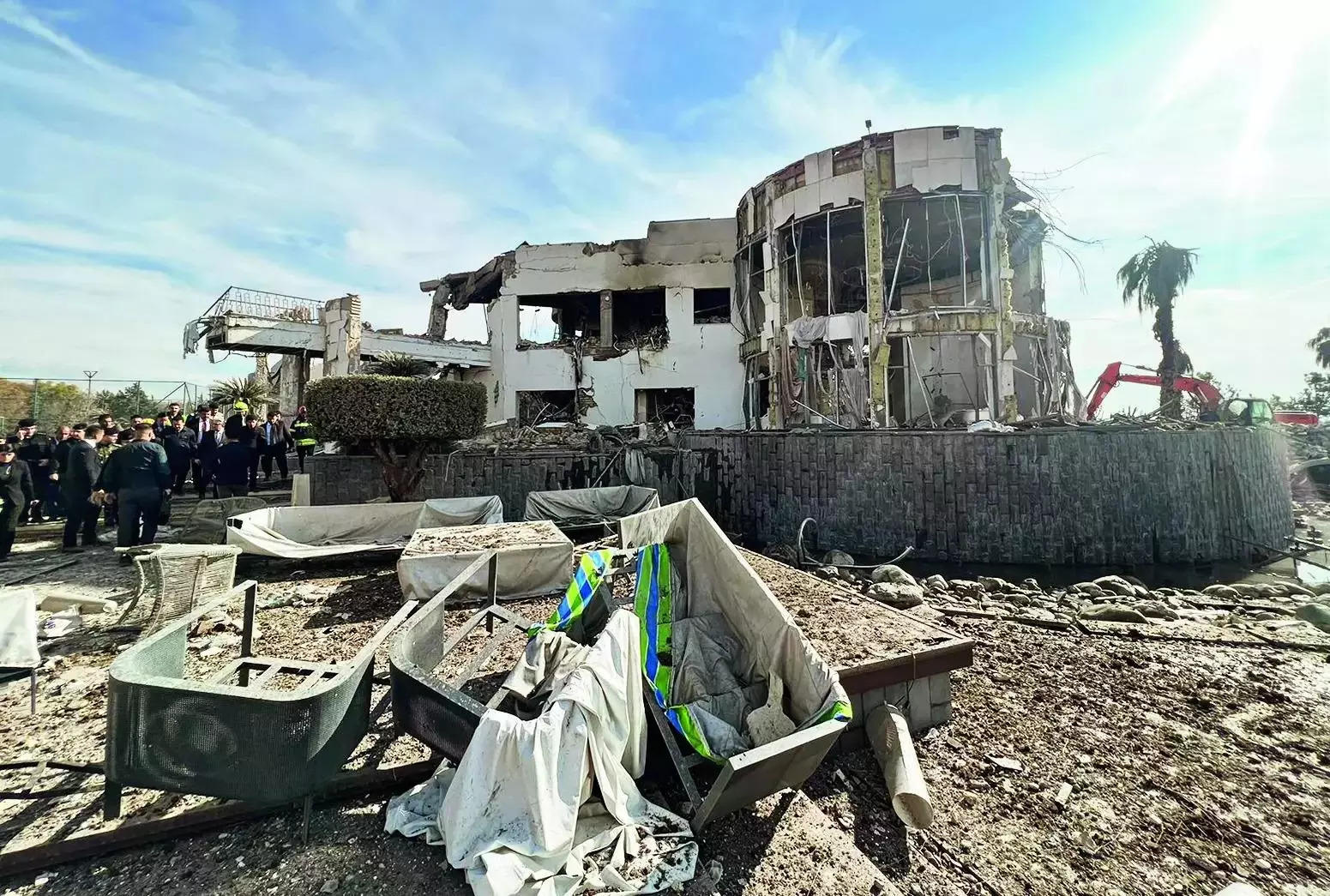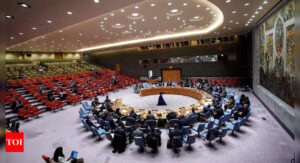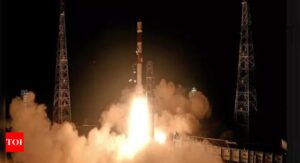

BAGHDAD: Iran hit its neighbours Pakistan and Iraq with missile strikes Tuesday, prompting strong denunciations from both countries and raising fears that upheaval in West Asia could spiral out of control. Since the war in the Gaza Strip began in October, Iran has used its proxy forces against Israel and its allies. But Tuesday, it said its latest missile strikes had been in response to terrorist attacks within its borders.The strikes raised tensions in a region where conflict has now touched at least five nations. “They are contributing to the escalation of regional tensions – and it must stop,” Catherine Colonna, France’s minister for Europe & foreign affairs, said.
The missile strike in Pakistan, a nuclear-armed state, hit a remote mountainous region Tuesday. The strike in Iraq, which has close political and military ties with Iran, hit the Kurdistan capital Irbil around midnight Tuesday and involved ballistic missiles and drones. In both cases, Iran officials said they were going after terrorists they accused of being behind recent attacks on its territory.
Iraq and Pakistan rejected Iran’s justifications. “Pakistan has always said terrorism is a common threat to all countries in the region that requires coordinated action,” a Pakistan statement said, describing it as “even more concerning that this illegal act has taken place despite the existence of several channels of communication.”
Iran’s actions came amid widespread fears that the devastating war in Gaza could become a broader and deadlier regional conflict. Privately, Iranian officials have been saying they want to avoid a larger conflict. But it has set off a low-level conflict between Iranian proxy forces and the US and other Western powers. The Houthis from Yemen have been disrupting global shipping in the Red Sea, while Hezbollah has been launching strikes on northern Israel from Lebanon. Iraqi militias closely linked to Iran have targeted US bases in Iraq and Syria over 130 times in the past three months. In addition to hitting Pakistan and Iraq, Iran has also struck Syria to target Islamic State. So far, there has been no public objection from Syrian government, which is closely allied with Iran.
The Iranian strike in Pakistan hit an area where the militant group that claimed responsibility for the attack on the police station in Rask, near Iran’s border with Pakistan, is believed to be based. Over the years, both Iran and Pakistan have accused each other of sheltering militants along their shared 900-km border.
Tehran points the finger at Jaish al-Adl, a militant group operating in southeastern Iran and on the Pakistan-Iran border, saying it has carried out attacks within Iranian territory. On Dec. 15, Jaish al-Adl attacked a police station in southeastern Iran, killing 11 officers.
Pakistan, in turn, has accused Iran of supporting separatists in Balochistan, a southwestern Pakistani province rich in oil and other natural resources that has been the site of an insurgency for decades.
The Iranian strike inside Pakistan – mired in political and economic crises – has left its officials facing a difficult decision about whether to retaliate. “If Pakistan hits back, it risks getting drawn into Middle East conflicts it has avoided so far,” said Husain Haqqani, a former Pakistani ambassador. “If it does not, it will appear weak yet again, and that will have consequences for the prestige of its armed forces.” Muhammad Ashfaque Arain, a former air marshal in Pak air force, pointed to the delicate position Pakistan was in, with a caretaker government in charge until the Feb 8 polls. “The fact that there is no elected government complicates the response.”
Arain noted that Pakistan was now confronting troubled ties with three of its neighbours. While India has long been an adversary, Pakistan’s ties with Afghanistan have also soured, with Islamabad accusing Afghan Taliban of providing shelter to militant groups, including Pakistani Taliban.
The strike on Tuesday was not the first time Iranian forces had hit inside Pakistan, but the attack was the deepest inside Pakistani territory. In 2021, Iran retrieved two Iranian soldiers who were being held hostage by Jaish al-Adl inside Pakistani territory. In 2017, the Pakistani Air Force shot down an Iranian drone. NYT
The missile strike in Pakistan, a nuclear-armed state, hit a remote mountainous region Tuesday. The strike in Iraq, which has close political and military ties with Iran, hit the Kurdistan capital Irbil around midnight Tuesday and involved ballistic missiles and drones. In both cases, Iran officials said they were going after terrorists they accused of being behind recent attacks on its territory.
Iraq and Pakistan rejected Iran’s justifications. “Pakistan has always said terrorism is a common threat to all countries in the region that requires coordinated action,” a Pakistan statement said, describing it as “even more concerning that this illegal act has taken place despite the existence of several channels of communication.”
Iran’s actions came amid widespread fears that the devastating war in Gaza could become a broader and deadlier regional conflict. Privately, Iranian officials have been saying they want to avoid a larger conflict. But it has set off a low-level conflict between Iranian proxy forces and the US and other Western powers. The Houthis from Yemen have been disrupting global shipping in the Red Sea, while Hezbollah has been launching strikes on northern Israel from Lebanon. Iraqi militias closely linked to Iran have targeted US bases in Iraq and Syria over 130 times in the past three months. In addition to hitting Pakistan and Iraq, Iran has also struck Syria to target Islamic State. So far, there has been no public objection from Syrian government, which is closely allied with Iran.
The Iranian strike in Pakistan hit an area where the militant group that claimed responsibility for the attack on the police station in Rask, near Iran’s border with Pakistan, is believed to be based. Over the years, both Iran and Pakistan have accused each other of sheltering militants along their shared 900-km border.
Tehran points the finger at Jaish al-Adl, a militant group operating in southeastern Iran and on the Pakistan-Iran border, saying it has carried out attacks within Iranian territory. On Dec. 15, Jaish al-Adl attacked a police station in southeastern Iran, killing 11 officers.
Pakistan, in turn, has accused Iran of supporting separatists in Balochistan, a southwestern Pakistani province rich in oil and other natural resources that has been the site of an insurgency for decades.
The Iranian strike inside Pakistan – mired in political and economic crises – has left its officials facing a difficult decision about whether to retaliate. “If Pakistan hits back, it risks getting drawn into Middle East conflicts it has avoided so far,” said Husain Haqqani, a former Pakistani ambassador. “If it does not, it will appear weak yet again, and that will have consequences for the prestige of its armed forces.” Muhammad Ashfaque Arain, a former air marshal in Pak air force, pointed to the delicate position Pakistan was in, with a caretaker government in charge until the Feb 8 polls. “The fact that there is no elected government complicates the response.”
Arain noted that Pakistan was now confronting troubled ties with three of its neighbours. While India has long been an adversary, Pakistan’s ties with Afghanistan have also soured, with Islamabad accusing Afghan Taliban of providing shelter to militant groups, including Pakistani Taliban.
The strike on Tuesday was not the first time Iranian forces had hit inside Pakistan, but the attack was the deepest inside Pakistani territory. In 2021, Iran retrieved two Iranian soldiers who were being held hostage by Jaish al-Adl inside Pakistani territory. In 2017, the Pakistani Air Force shot down an Iranian drone. NYT






